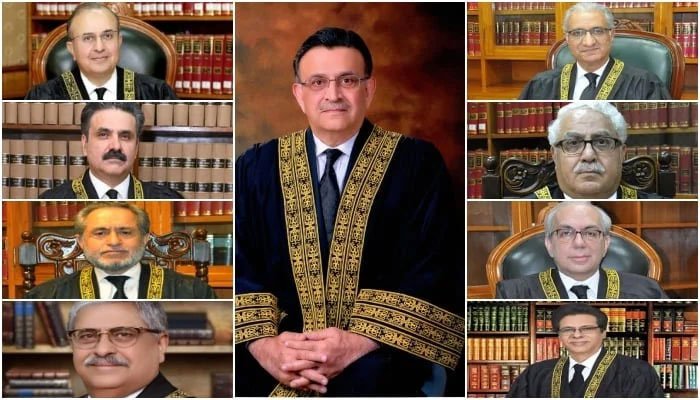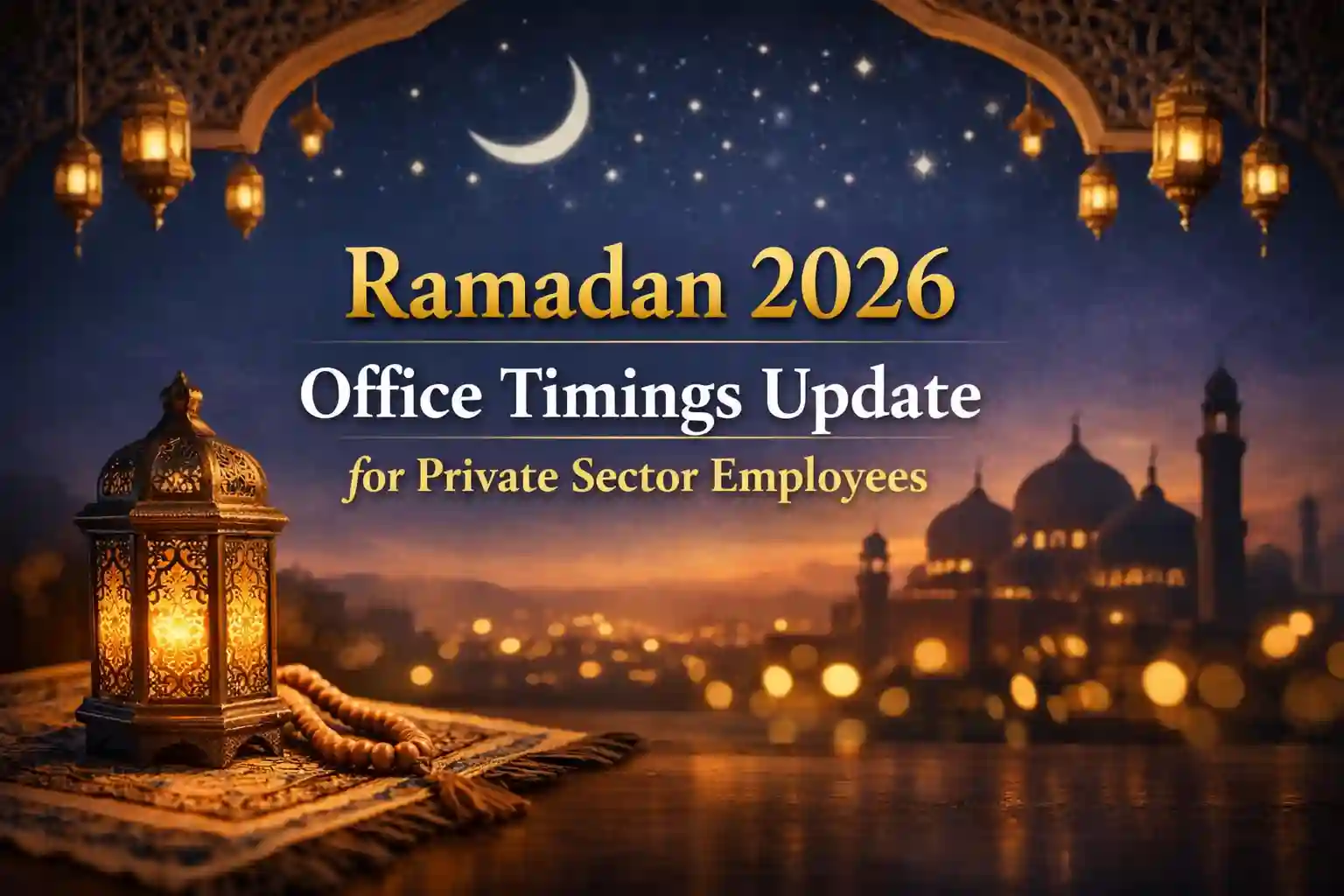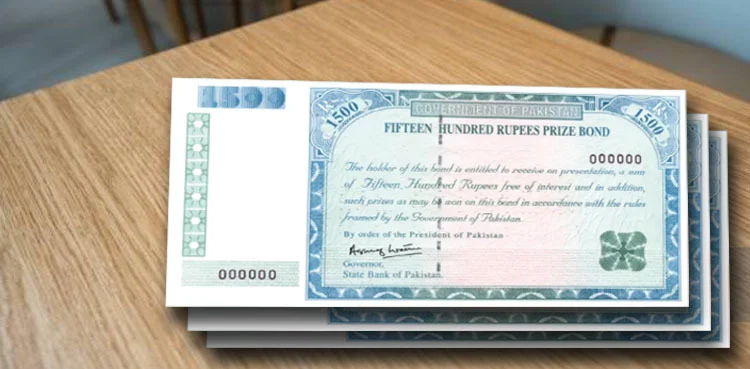When the hearing began, CJP Bandial shared that four judges had recused themselves from the bench.
Election suo motu: Nine-member SC bench dissolved after recusal of four judges. The nine-member larger bench of the Supreme Court formed to hear the suo motu notice related to the elections in Khyber Pakhtunkhwa and Punjab was dissolved and a new five-member bench is hearing the case.
The bench was reconstituted after Justice Ijaz Ul Ahsan, Justice Sayyed Mazahar Ali Akbar Naqvi, Justice Athar Minallah and Justice Yahya Afridi recused themselves from hearing the case.
The hearing of the case was scheduled to start today at 11am, however, it was delayed reportedly due to the bench formation in the light of a Supreme Court order of the February 23 hearing.
A written order was issued on the SC’s website in which dissenting notes of Justice Afridi, Justice Minallah, Justice Jamal Khan Mandokhail and Justice Syed Mansoor Ali Shah had been included.
Following this, a five-member bench headed by Chief Justice Umar Ata Bandial and comprising Justice Munib Akhtar, Justice Muhammad Ali Mazhar, Justice Shah and Justice Mandokhail resumed the hearing.
When the hearing began, CJP Bandial shared that four judges had recused themselves from the bench.
“The rest of the court’s bench will keep on hearing the case,” said the CJP. He added that the court will continue hearing the case for the interpretation of the Constitution.
The CJP also noted that till the written order is not released on the website they cannot issue it. He noted that Justice Mandokhail’s dissenting note was shared on social media before the written order was released.
“We will be careful that this does not happen in the future,” said the CJP.
The court then directed Barrister Ali Zafar, the counsel for the speakers of the Punjab and Khyber Pakhtunkhwa assemblies, to argue whether the court should hear the case or not.
More From FactFile: Supreme Court suspends transfer order of Lahore CCPO Dogar
“Can the court hear this case or not? In any situation, the case has to be completed tomorrow,” said the CJP.
At this, Pakistan Peoples Party (PPP) lawyer interjected that the ruling parties had filed a plea for the formation of a full court.
The CJP then remarked that they will hear all the pleas and decide them.
Following this, Zafar, the lawyer representing the speakers’, began his arguments and said that the Punjab chief minister had sent the summary for the dissolution of the assembly to the governor.
“The governor was bound to dissolve the assembly, however, he did not and the assembly was automatically dissolved 48 hours after his refusal,” said Zafar.
The lawyer said that no constitutional officeholder can delay elections for more than 90 days, and the 90-day period in Punjab started on January 14.
“Who appoints the governor?” questioned Justice Mazhar.
At this, Zafar said that the governor is appointed after the president’s approval.
Upon hearing this, Justice Mazhar remarked that there is a difference between an assembly being dissolved by the governor and its dissolution by itself following completion of constitutional term.
While Justice Mandokhail asked whose job is it to decide the date for elections.
At this, Zafar said that a suo motu notice has been taken regarding a date for the elections.
“There is no such provision in the Constitution that justifies delay in the elections beyond the 90-day time limit,” remarked Justice Mazhar.
“Can the elections be delayed by someone?” he asked.
To this, Zafar said that no one can delay the elections.
Justice Mazhar said that the Punjab governor threw the ball in the Election Commission of Pakistan’s (ECP) court.
“Ping pong is being played over the lection date,” Zafar told the bench.
Meanwhile, Justice Shah inquired if the case in the Lahore High Court (LHC) was adjourned at the request of parties?
At this, Sheikh Rashid’s lawyer Azhar Siddique told the bench that the case in the high court was adjourned because the matter was being heard in the apex court.
While, Zafar told the bench that no stay order had been issued on the intra-court appeals by the LHC.
Upon hearing this, Justice Shah wondered whether any contempt of court petitions had been filed in the LHC after it had given the orders for the announcement of a date for the polls.
At this, Zafar informed that a contempt of court plea had been filed against the ECP. While, Sheikh Rashid’s counsel added that the electoral body had submitted a vague reply over the contempt plea.
At this point, CJP Bandial asked if any reason was provided for such a long adjournment on the intra-court appeal in Lahore.
“Without a solid reason, hearing on such an important matter cannot be adjourned for too long,” he observed.
Siddique told the court that the ECP sought time to submit a reply to the LHC and hence, the hearing was adjourned.
“Election Commission failed to respect the high court’s orders,” Zafar told the court.
Siddique said that the contempt of court plea was filed on February 14 in the LHC and a response was sought from the ECP.
“The president wrote two letters on the matter,” said Zafar, adding that the letter — sent on February 8 — sought a date for elections from the ECP.
At this, the CJP inquired if the ECP responded to President Arif Alvi’s first letter.
Zafar replied that as per his information the ECP did not respond to the president’s first letter.
Meanwhile, Justice Shah remarked that the president’s letter was contrary to the high court’s order.
“The high court had asked to give the date after consultations with the governor,” he said, adding that the president asked the electoral body to give a date for elections.
At this, Justice Mazhar said that the ECP had written in its reply that consulting with the governor is not in the Constitution.
“If the consultations did not take place then the commission should have given a date itself,” he added.
The ECP says that it cannot give a date for the elections, said Zafar. He added that the real issue is that no one wants to give a date for the elections.
He said that the president, in his letter, had clarified all the facts regarding the date of the elections.
On this, Justice Mandokhail asked if someone had approached President Alvi for the election date or if he gave it unilaterally.
The president had to intervene as it was a matter of basic rights, said Zafar, adding that “someone has to announce a date”.
Zafar said that if the court believes that ECP should give the date then it should issues orders to it.
“If the parties think that the elections are to be held by some other organisation then they should inform the court as well,” he added.
Situation in KP
At this point, Justice Akhtar asked about the situation in KP.
On this, Barrister Zafar informed the court that the governor had dissolved the assembly in KP and asked the ECP to hold consultations with the stake holders.
“The KP governor has made the security a basis in his letter,” he said. As far as the election date was concerned, even the KP governor has not given a date, he added.
Meanwhile, the lawyer representing the ECP informed the bench that three constitutional pleas were under trial in the Peshawar High Court (PHC).
At this, CJP Bandial inquired why had the high court given a 21-day notice to the parties.
“A legal point has to be decided. It’s not a civil suit that so much time was given,” the CJP remarked.
At this, Zafar interjected that the KP assembly was dissolved on January 18.
“What progress has been made on the elections in KP,” CJP Bandial asked.
Meanwhile, Justice Mandokhail asked that whether the governor could suggest holding consultations citing terrorism.
At this, Zafar told the court that in his opinion the KP governor did not have the authority to write such a letter.
“This case is now based only on the question of who has the authority to give the election date,” CJP Bandial remarked.
Meanwhile, Justice Mansoor remarked that the ECP was saying that the option of consultation for deciding a date for the election is not written in the Constitution.
At this, Justice Mazhar asked if it would be a contempt of court if the ECP itself gave the date.
Responding to the question Zafar said that all of it was the “delaying tactics” and ECP giving the election date was constitutional.
“The suo motu notice asks who will give the election date,” Justice Mandokhail remarked.
At this, Zafar said that someone has to announce a date. He said that it cannot be the case that the election is delayed for 10 years, therefore the other party should tell who can give the date.
CJP Bandial remarked that the reason should be stated if the circumstances were not suitable for holding elections.
Meanwhile, Justice Mazhar regretted that the election date couldn’t be announced even after a month since the dissolution of the assembly.
Justice Mazhar said that when the election date is announced, a decision will be made on whether polls can be conducted on that date or not. He added that a whole month was wasted just because the governor had said to hold consultations.
“Ensuring law and order is ECP’s responsibility, and not of the governor,” highlighted Justice Mandokhail. He inquired whether the matter pertaining to the law and order can become a hinderance on the constitutional requirement of holding elections.
The CJP recalled that the assemblies in 2013 and 2018 had completed their terms.
At this point, ECP’s director general (DG) law said that the president announces the date of elections if the assembly completes its term.
Meanwhile, Justice Akhtar remarked that the chief minister’s advice was implemented in KP but not in Punjab.
“If there are no assemblies then there is no other way of governance in the Constitution. This is why a 90-day limit has been set for the elections,” said Barrister Zafar.
He stressed that the elections must be held within the 90-day period.
“The Election Commission’s job is to conduct elections,” said CJP Bandial.
Zafar said that the ECP is responsible for the arrangement of polls and conduct the elections. “The ECP has to conduct national, provincial and local polls as per the Constitution,” he added.
“The ECP is responsible to hold elections under Article 218, 219, and 222 and all the executive institutions are bound to assist the ECP in conducting polls,” said Zafar.
He said that the court should take action if the ECP shows helplessness.
The CJP then adjourned the hearing for a recess and adjourned the hearing till 4pm.





